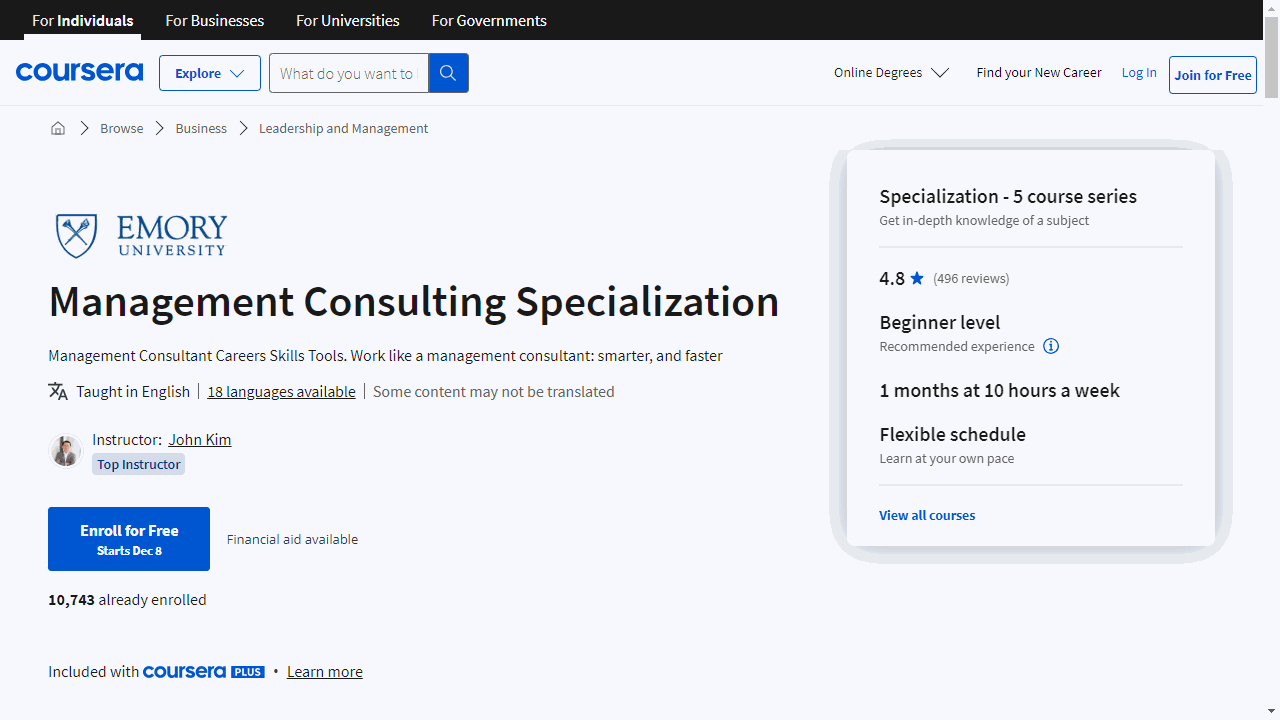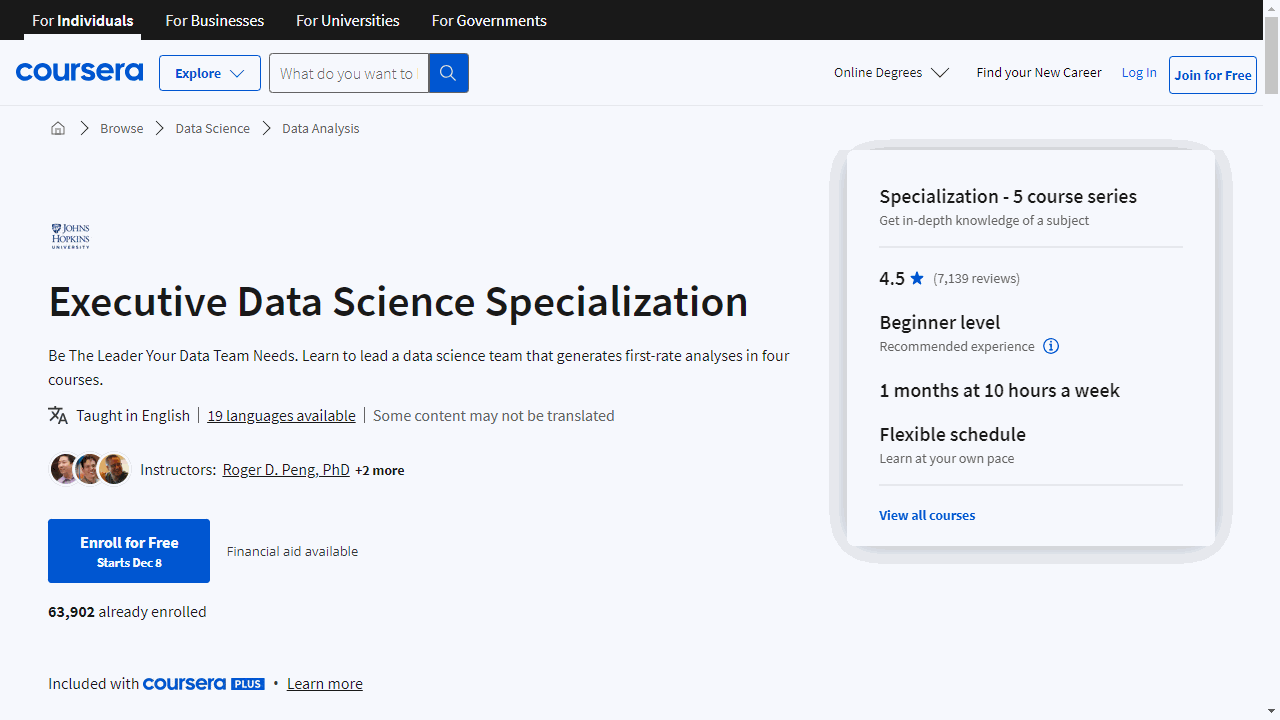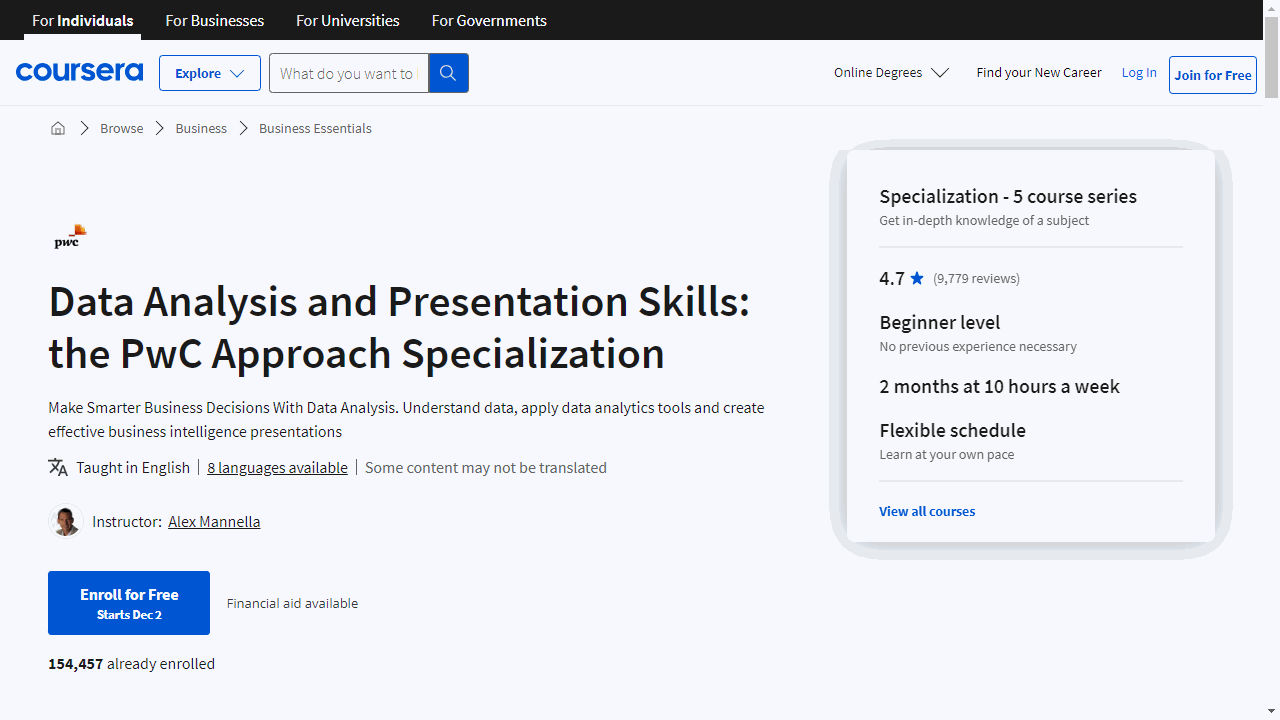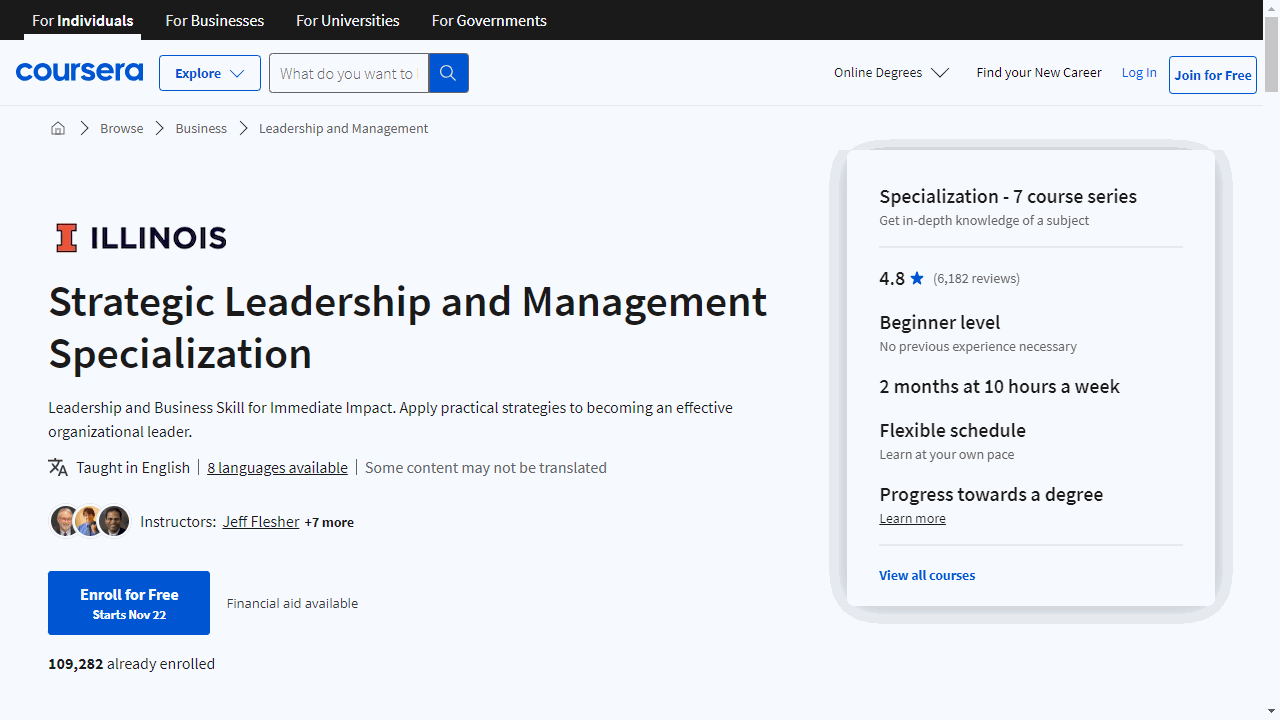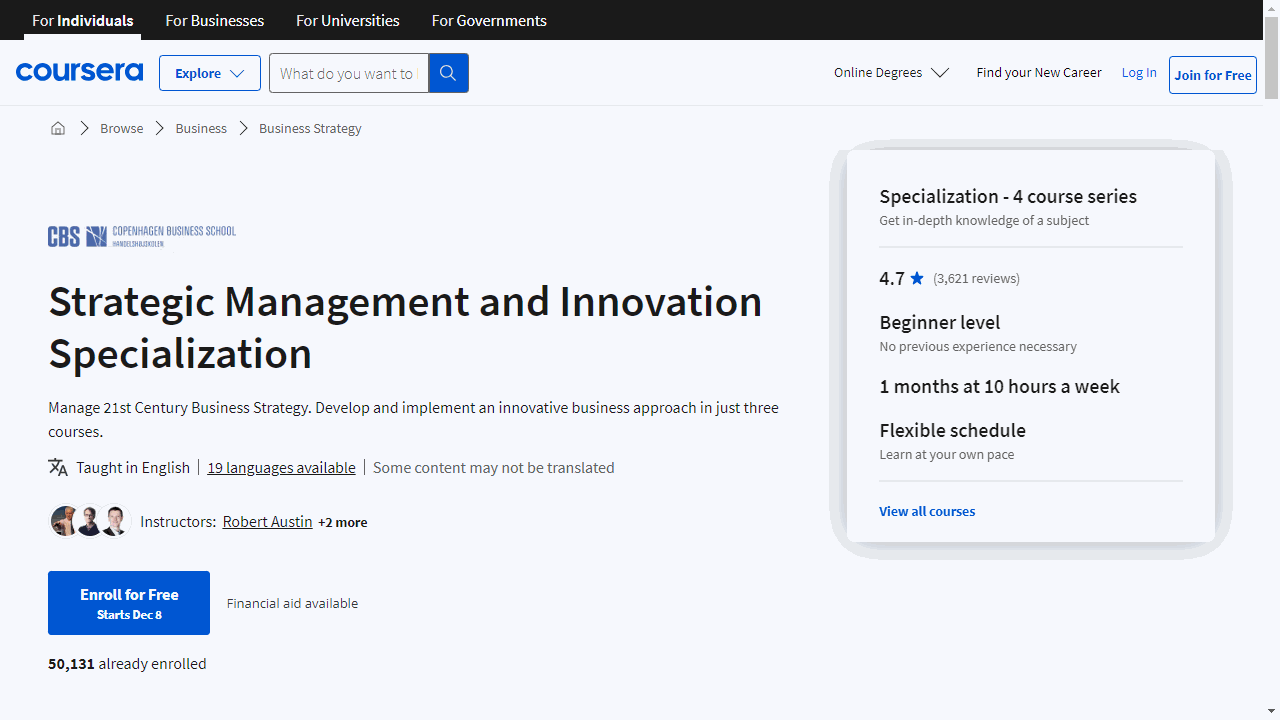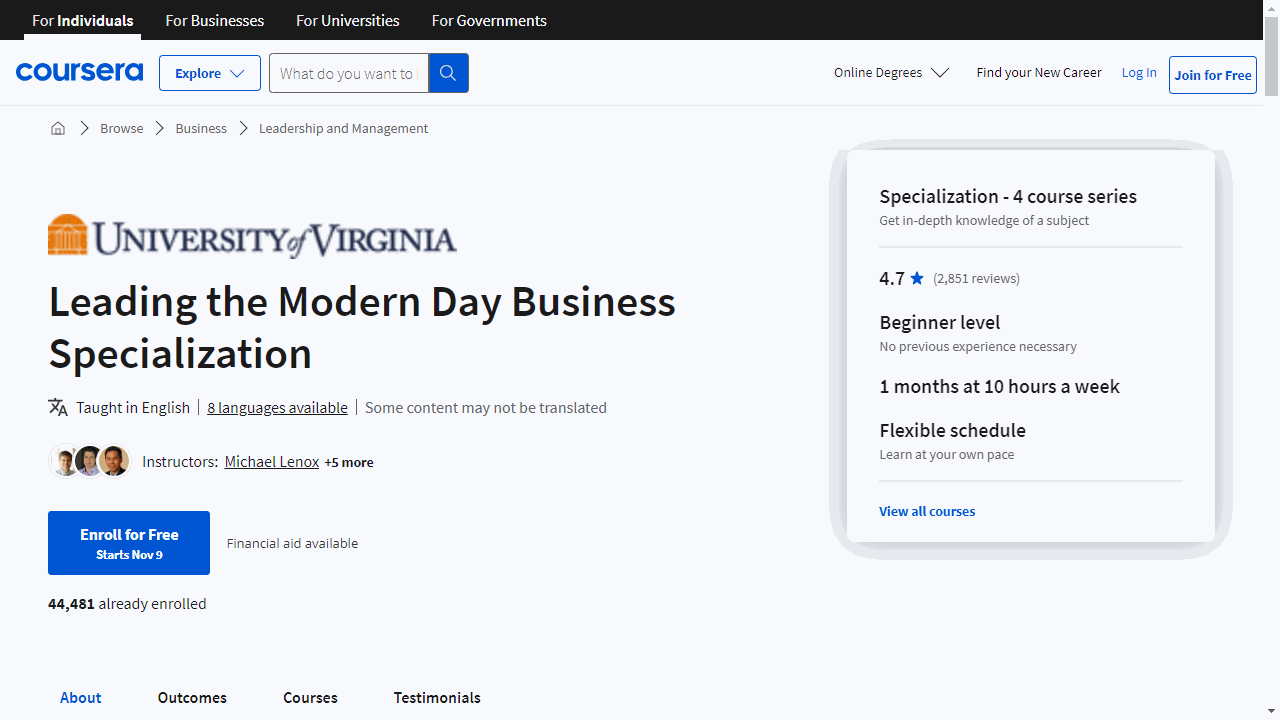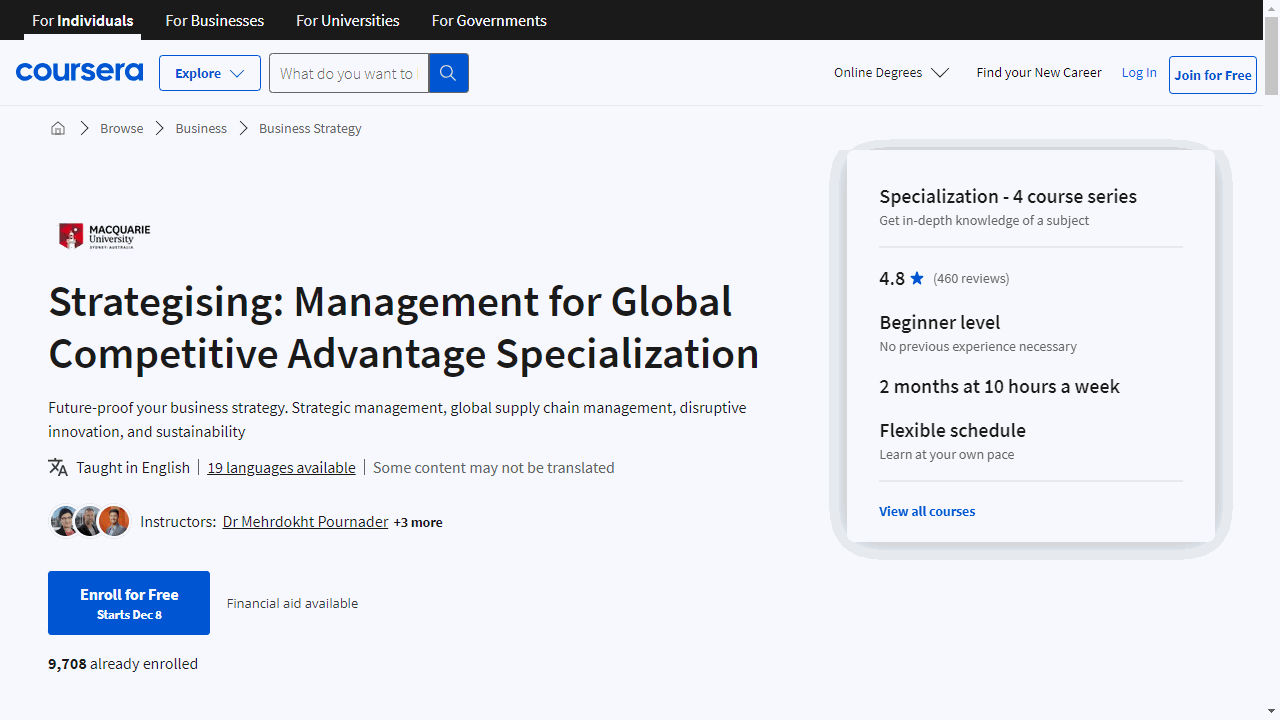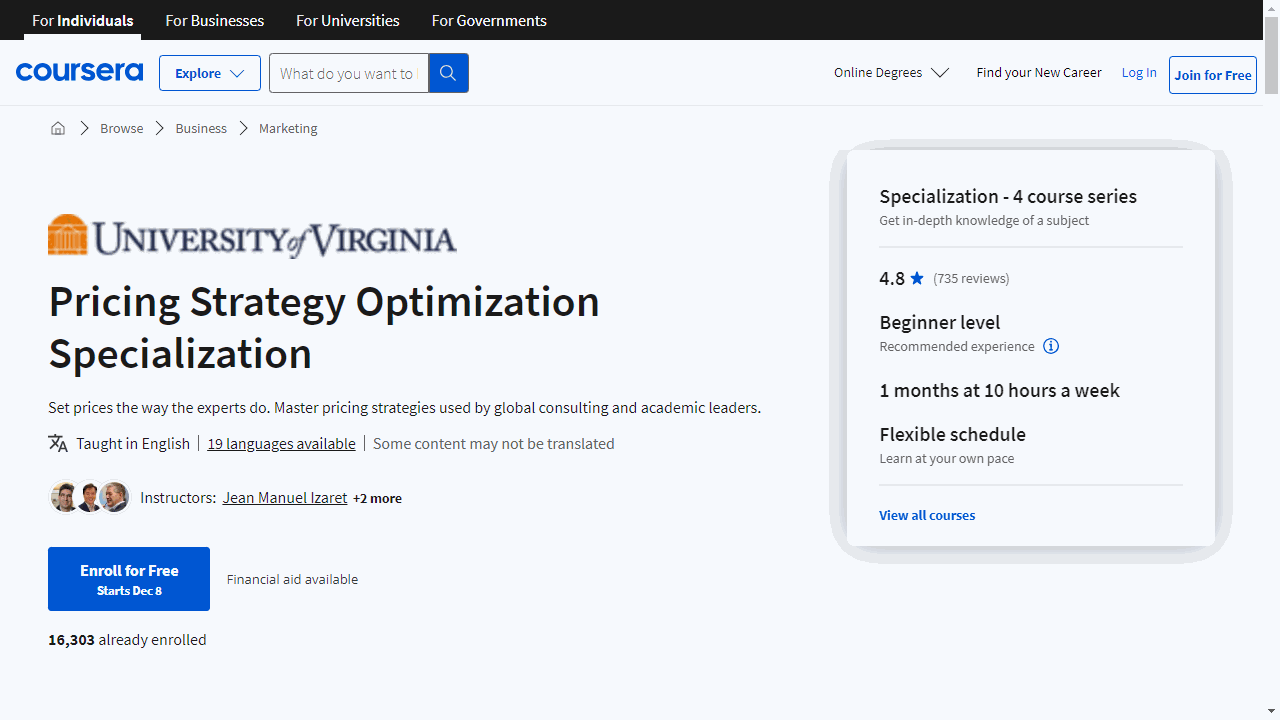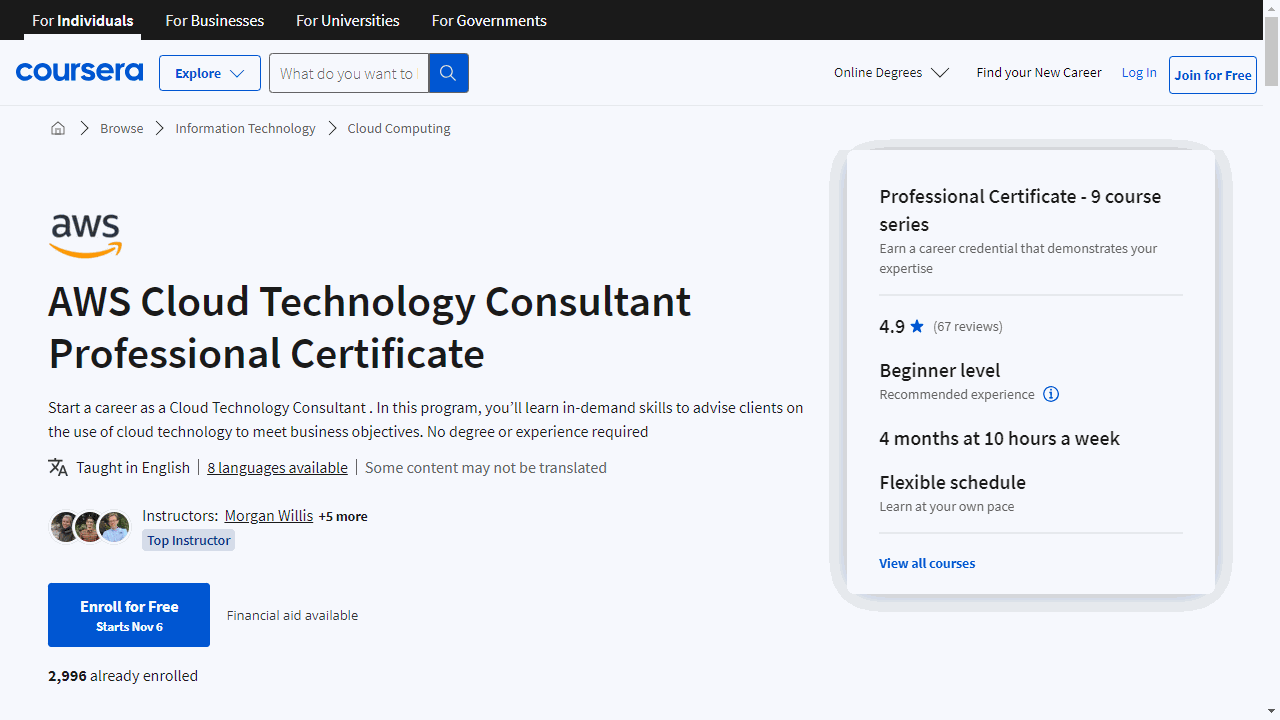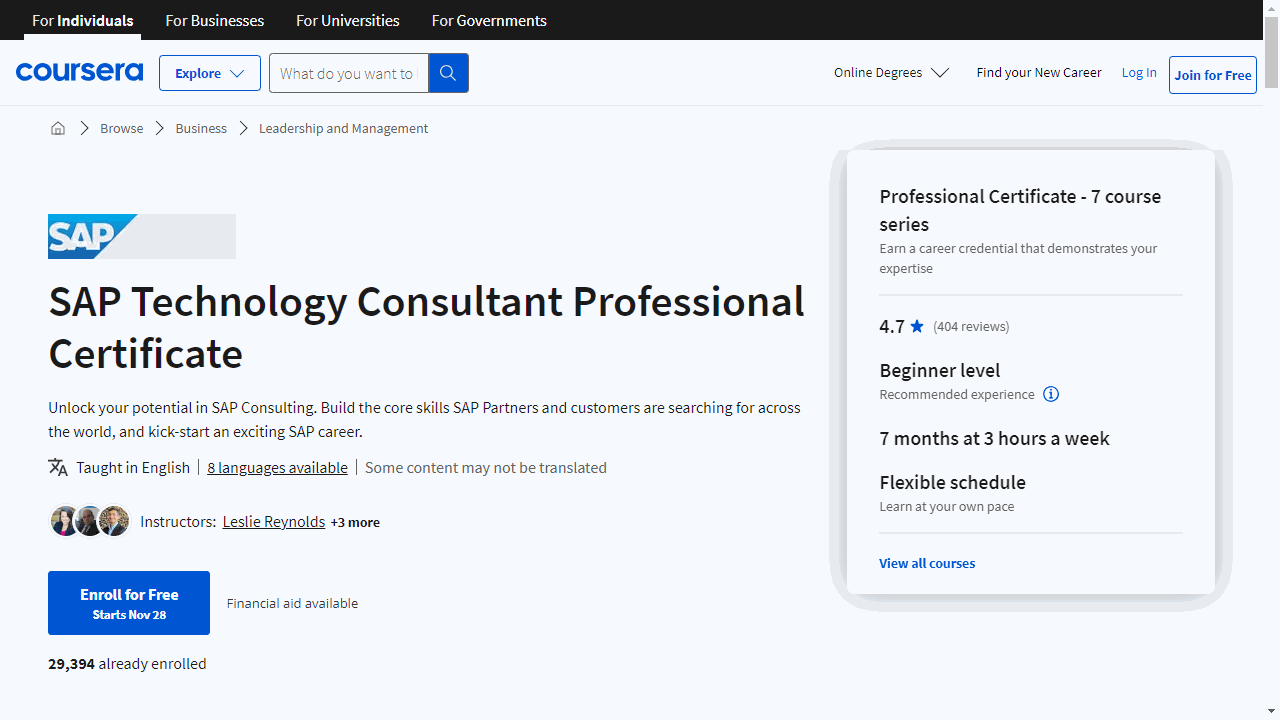Management consulting is a dynamic field where professionals leverage their analytical skills, business acumen, and problem-solving abilities to advise organizations on strategic improvements.
A career in management consulting offers exciting opportunities for intellectual growth, professional development, and impactful work across diverse industries.
Learning the fundamentals of management consulting can equip you with invaluable skills for navigating complex business challenges and achieving impactful results, regardless of your chosen career path.
Finding a high-quality management consulting course on Coursera can be a daunting task, given the vast array of options available.
You want a program that’s comprehensive, engaging, and taught by industry experts, ensuring you acquire the knowledge and skills needed to excel in this competitive field.
For the best management consulting course overall on Coursera, we recommend the Management Consulting Specialization offered by Emory University.
This program stands out for its real-world focus, taught by experienced industry practitioners like former Deloitte consultant John Kim.
You’ll dive into essential topics like problem-solving techniques, consulting career paths, case interview preparation, and the art of crafting impactful presentations.
This specialization will equip you with the practical knowledge and skills needed to succeed in the fast-paced and intellectually stimulating world of management consulting.
While this is our top pick, it’s just one of many excellent options available.
Keep reading to discover other great management consulting courses on Coursera tailored to different learning styles, interests, and career goals.
Management Consulting Specialization
This specialization offered by Emory University is packed with the essentials you need to thrive in the management consulting world, taught by industry experts like ex-Deloitte consultant John Kim.
Kick off with “Introduction to Management Consulting” to grasp the core of what consultants do and the skills that make them indispensable to clients.
You’ll explore the consulting career and learn problem-solving techniques that can immediately benefit your work.
Move on to “Getting a Consulting Job” to understand the inner workings of consulting firms and what it takes to succeed in case interviews.
This course is your guide to networking with recruiters and identifying what firms seek in their consultants.
In “Consulting Approach to Problem Solving,” you’ll master the art of breaking down complex problems and using data to inform decisions.
The course introduces you to the DMAIC framework, enhancing your ability to approach business challenges methodically.
“Consulting Tools and Tips” equips you with the ability to quickly learn new topics and develop a toolkit for data creation through client interactions and industry analysis.
You’ll learn to ask the right questions and build robust Excel models.
Lastly, “Consulting Presentations and Storytelling” teaches you to craft impactful presentations that tell a clear story.
You’ll learn to align stakeholders, make assumptions transparent, and deliver your findings with confidence.
Throughout the specialization, you’ll acquire practical skills in project management, data analysis, executive presence, and business strategy.
Executive Data Science Specialization
This specialization is offered by Johns Hopkins University.
This program equips you with the essentials of data science management without overwhelming you with technical jargon.
Kick off with “A Crash Course in Data Science,” where you’ll grasp the significance of data science in various business contexts.
You’ll understand the impact of statistics and machine learning and learn to distinguish between successful and unsuccessful data science projects.
Key terms and tools will become part of your vocabulary, setting a solid foundation for your leadership in data science.
In “Building a Data Science Team,” you’ll dive into team dynamics.
Discover how to recruit, organize, and empower a data science team.
You’ll get insights into the roles within a team, the qualifications needed, and the questions to ask in interviews.
This course is about nurturing a team that’s set up for success.
“Managing Data Analysis” focuses on the data analysis process.
You’ll learn to navigate through the iterative nature of data analysis, from asking sharp questions to interpreting results.
This course is about steering your team toward delivering meaningful insights from data.
“Data Science in Real Life” prepares you for the unpredictable.
It contrasts the ideal data science scenario with real-life challenges.
You’ll learn to manage data quality, address biases, and communicate findings effectively.
This course is about leading with adaptability and critical thinking.
The “Executive Data Science Capstone” is where you apply your learning.
You’ll lead a virtual team through a project, making strategic decisions and crafting a presentation of your analysis.
This is your chance to showcase your ability to manage a data science project from start to finish.
Each course requires just a week of study for 4-6 hours, fitting seamlessly into your schedule.
You’ll gain practical skills in statistics, data analysis, team management, and be equipped to lead data science initiatives with authority.
Data Analysis and Presentation Skills: the PwC Approach Specialization
This series goes beyond traditional speaking skills by integrating data analysis into your presentations.
It derives from PwC’s approach to data analytics, a framework that’s been refined over decades of professional services experience.
In “Data-driven Decision Making,” you’ll uncover the significance of data in business and learn to navigate the world of “Big Data.”
This course equips you with analytical tools and techniques, setting the stage for informed decision-making.
Moving on to “Problem Solving with Excel,” you’ll master Excel from the ground up, culminating in a project that showcases your proficiency.
Keep in mind, this course is optimized for Excel 2013 on Windows.
With “Data Visualization with Advanced Excel,” you’ll delve into PowerPivot, build databases, and perform complex analyses.
You’ll also craft dynamic dashboards, translating data into visual stories.
Note that PowerPivot is necessary for some exercises, and Excel 2013 is recommended.
“Effective Business Presentations with PowerPoint” is where your public speaking skills get a workout.
You’ll learn to design impactful slides and deliver presentations with clarity and confidence, turning data into persuasive narratives.
Lastly, the capstone project challenges you to apply all your new skills.
You’ll analyze a dataset, research a client’s domain, and present your recommendations in a recorded presentation.
Strategic Leadership and Management Specialization
The specialization from the University of Illinois at Urbana-Champaign begins with “Leading Teams: Developing as a Leader,” where you’re not just learning about leadership; you’re actively shaping your own style.
This course helps you understand the core of leadership, assess your competencies, and guides you in making ethical decisions while fostering trust within your team.
Building on that foundation, “Leading Teams: Building Effective Team Cultures” takes you into the realm of team dynamics.
Here, you’ll learn to cultivate a team culture that prioritizes safety, engagement, and growth, setting the stage for high-performing teams.
With “Designing the Organization,” you’ll gain a strategic edge in understanding organizational complexities.
This course equips you with theories and frameworks to design an organization that’s adaptable and poised for success.
“Managing the Organization” complements this by focusing on the practical aspects of management.
You’ll tackle real-world managerial challenges, learn to wield power strategically, and navigate the intricacies of organizational culture and ethics.
For those with an eye on the bigger strategic picture, “Business Strategy” offers insights into how organizations create and sustain value.
You’ll master strategic management tools and learn to align internal operations with the external environment for optimal performance.
“Corporate Strategy” expands your perspective to the corporate level, where you’ll learn to manage multiple business units and stakeholders.
This course covers decisions on vertical integration, diversification, and global strategy, all crucial for a well-rounded corporate leader.
The capstone project is where theory meets practice.
You’ll apply your newfound knowledge to a real business challenge, demonstrating your ability to create strategic value and showcasing your skills to potential employers.
The skills you’ll gain are not just theoretical; they’re practical, in-demand, and directly applicable to your career.
Moreover, these courses are part of the Gies College of Business’ respected online programs, meaning you’re receiving a quality education that can also contribute to further academic achievements if you choose to pursue them.
Strategic Management and Innovation Specialization
This specialization offered by Copenhagen Business School is tailored for the modern business landscape, where innovation and perception often trump traditional assets.
Kick off with “Strategic Management,” where you’ll learn to navigate the shifting terrain of business strategy.
You’ll understand why strategic thinking is crucial and how to evolve past outdated strategies.
This course also sets you up for the specialization’s Capstone Project.
Move on to “Strategy Formulation,” where you’ll get hands-on with creating strategies that align with your company’s goals.
You’ll tackle real-world scenarios, learning to craft strategies that stand out in various markets and industries.
Then, “Strategy Implementation” teaches you to turn those strategies into action.
You’ll discover how to set clear objectives, choose supportive organizational structures, and communicate your vision effectively to ensure successful implementation.
The journey culminates with the “Strategic Management - Capstone Project,” where you apply your newfound skills to analyze and strategize for actual business cases.
With a manageable weekly commitment of 10 hours, you’ll build competencies in strategic management, planning, and thinking.
You’ll also learn to identify and address implementation risks.
Leading the Modern Day Business Specialization
Navigating the complexities of the modern business landscape requires a robust skill set, and the “Leading the Modern Day Business Specialization”, offered by the University of Virginia on Coursera, teaches a comprehensive toolkit for those eager to excel.
Each course within this specialization is designed to address key areas of business leadership and innovation.
The “Digital Transformation” course demystifies the buzzword by breaking down the economics of innovation and the realities of technology disruptions.
It’s not just about keeping pace with change; it’s about understanding and leveraging it to your advantage.
With insights from the Darden School of Business and the Boston Consulting Group, you’ll learn to apply a strategic framework to digitize your organization effectively.
In “Design Thinking for Innovation,” you’ll discover that innovation isn’t confined to creative industries—it’s a mindset that’s crucial across all sectors.
This course teaches you to harness design thinking to identify and act on opportunities, fostering a culture of innovation wherever you are.
It’s about thinking differently and finding solutions that others might miss.
For those interested in the intersection of technology and business, “Digital Product Management: Modern Fundamentals” offers a deep dive into the evolving role of product managers.
You’ll explore how to navigate vast data sets and customer insights to steer your product’s direction.
This course is tailored to those who want to stay ahead in a digital-first environment, providing methods to manage and grow your product portfolio.
Lastly, “Customer-Centric IT Strategy” tackles the high stakes of IT investment.
With a focus on design thinking and agile methodologies, this course equips you to align IT initiatives with broader business objectives.
You’ll learn to use tools like the Business Model Canvas to ensure your IT strategies resonate with stakeholders and deliver value.
Each course stands on its own merit, offering specialized knowledge that can propel you forward in your career.
Together, they form a cohesive learning experience that prepares you to lead with confidence in a digital, design-focused, and customer-oriented business world.
Strategising: Management for Global Competitive Advantage Specialization
This series of courses offered by Macquarie University equips you with the skills needed to navigate and lead in the competitive business landscape.
Dive into “Supply Chain Management: Be Global” to master the art of crafting efficient, sustainable supply chains that align with business strategies.
You’ll learn to balance cost, quality, and flexibility, while identifying risks and designing networks that respond to global demands.
With “Innovation and Emerging Technology: Be Disruptive,” you’ll embrace strategic thinking to harness disruptive technologies.
This course empowers you to develop innovative business models and understand the impact of new tech on industries and societies.
“Global Sustainability and Corporate Social Responsibility: Be Sustainable” shifts your focus to the ethical dimensions of business.
You’ll explore how to make decisions that consider financial success, customer well-being, and societal impact, using systems thinking to drive sustainable business practices.
Finally, “Strategic Management: Be Competitive” sharpens your ability to analyze competition and create value.
You’ll delve into competitor and customer analysis, learn to craft compelling value propositions, and apply Porter’s Five Forces Analysis to develop actionable strategic options.
Each course is interactive, with video lectures and assessments designed to build your expertise in areas like risk assessment, strategic thinking, and sustainability.
Pricing Strategy Optimization Specialization
This specialization offered by University of Virginia partners with Boston Consulting Group to equip you with the tools to set prices that maximize profits by delving into cost, customer value, and market competition.
In “Cost and Economics in Pricing Strategy,” you’ll learn to apply economic principles to pricing decisions.
You’ll explore price discrimination, calculate price elasticity, and master pricing models like cost-plus and peak-load pricing.
This course empowers you to make informed pricing choices that can boost your bottom line.
“Customer Value in Pricing Strategy” shifts the focus to what customers are willing to pay.
You’ll discover how to assess customer value and leverage psychological insights to craft effective pricing strategies.
By the end of this course, you’ll be adept at using surveys and conjoint analysis to inform your pricing decisions.
With “Market and Competition in Pricing Strategy,” you’ll analyze how competitor prices influence your own pricing strategy.
You’ll learn to use game theory to anticipate market behavior and respond strategically to competitors’ moves.
This course helps you navigate the competitive landscape to optimize your pricing.
Finally, “Pricing Strategy in Practice” offers a practical application of your new skills.
You’ll tackle a real-world case, using cost, customer, and competition lenses to set strategic prices.
This course culminates in a project that showcases your ability to respond to market disruptions and make data-driven pricing decisions.
By completing this specialization, you’ll gain valuable skills like understanding price elasticity, customer psychology, and competitor pricing models.
AWS Cloud Technology Consultant Professional Certificate
This comprehensive program includes 9 courses designed to teach you everything you need to know to become an AWS cloud consultant.
The courses provide a solid foundation in AWS and cloud basics before diving into technical skills like Python programming, automation, databases, and more.
For example, the “Introduction to Information Technology and AWS Cloud” course covers computing fundamentals, cloud security, and careers.
“AWS Cloud Technical Essentials” then builds your cloud knowledge with a hands-on look at core services like EC2, S3, and Lambda.
Crucially, the certificate also develops the soft skills needed for consulting, like communication, requirements gathering, and relationship building.
The “Skills for Working as an AWS Cloud Consultant” course focuses entirely on mastering these abilities.
The certificate culminates with a Capstone project where you put your new skills into practice following the AWS Well-Architected Framework.
This ensures you can make informed decisions about architecture design and mitigate risks.
With engaging video lectures, knowledge checks, and hands-on labs, these courses deliver the perfect blend of theory and practical experience.
The skills you gain will make you a highly qualified cloud consultant.
Businesses are rapidly migrating to the cloud. With this certificate on your resume, you’ll be ready to guide them through that transition and thrive in your career.
SAP Technology Consultant Professional Certificate
The journey begins with “SAP Professional Fundamentals,” where you’ll get acquainted with the SAP ecosystem and the diverse roles within it.
This course emphasizes the blend of technical know-how and soft skills essential for a consultant, covering methodologies like Agile and DevOps, and setting the stage for the entire SAP lifecycle.
As you progress to “Understanding the Enterprise Systems Environment,” your knowledge expands to the digital infrastructure that underpins SAP solutions.
You’ll delve into system design, cloud strategy, and SAP’s development models such as ABAP and Fiori, ensuring you can align IT solutions with business processes.
In “SAP Customer Engagement and Discovery,” the focus shifts to the SAP Activate methodology, teaching you to effectively engage with clients and map out their transformation objectives.
This course hones your ability to conduct discovery workshops and articulate the value of SAP solutions to stakeholders.
“Designing an SAP Solution” immerses you in the implementation lifecycle, equipping you with the skills to identify business needs, bridge technical gaps, and craft tailored SAP solutions.
It’s a deep dive into the practical aspects of solution design and client presentations.
The “Implementing an SAP Solution” course is where theory meets practice.
You’ll engage in the hands-on aspects of SAP projects, from setting up test environments to documenting post-implementation reviews, ensuring you’re prepared for real-world challenges.
The capstone, “SAP Technology Consultant Hands-on Project,” is your opportunity to apply your cumulative knowledge to a practical challenge, simulating a full SAP project cycle and reinforcing your learning with tangible experience.
Finally, “Becoming an SAP Professional” rounds out your education, guiding you through career planning, job market navigation, and personal branding.
This course is about leveraging your new skills to launch or advance your career in the SAP field.
